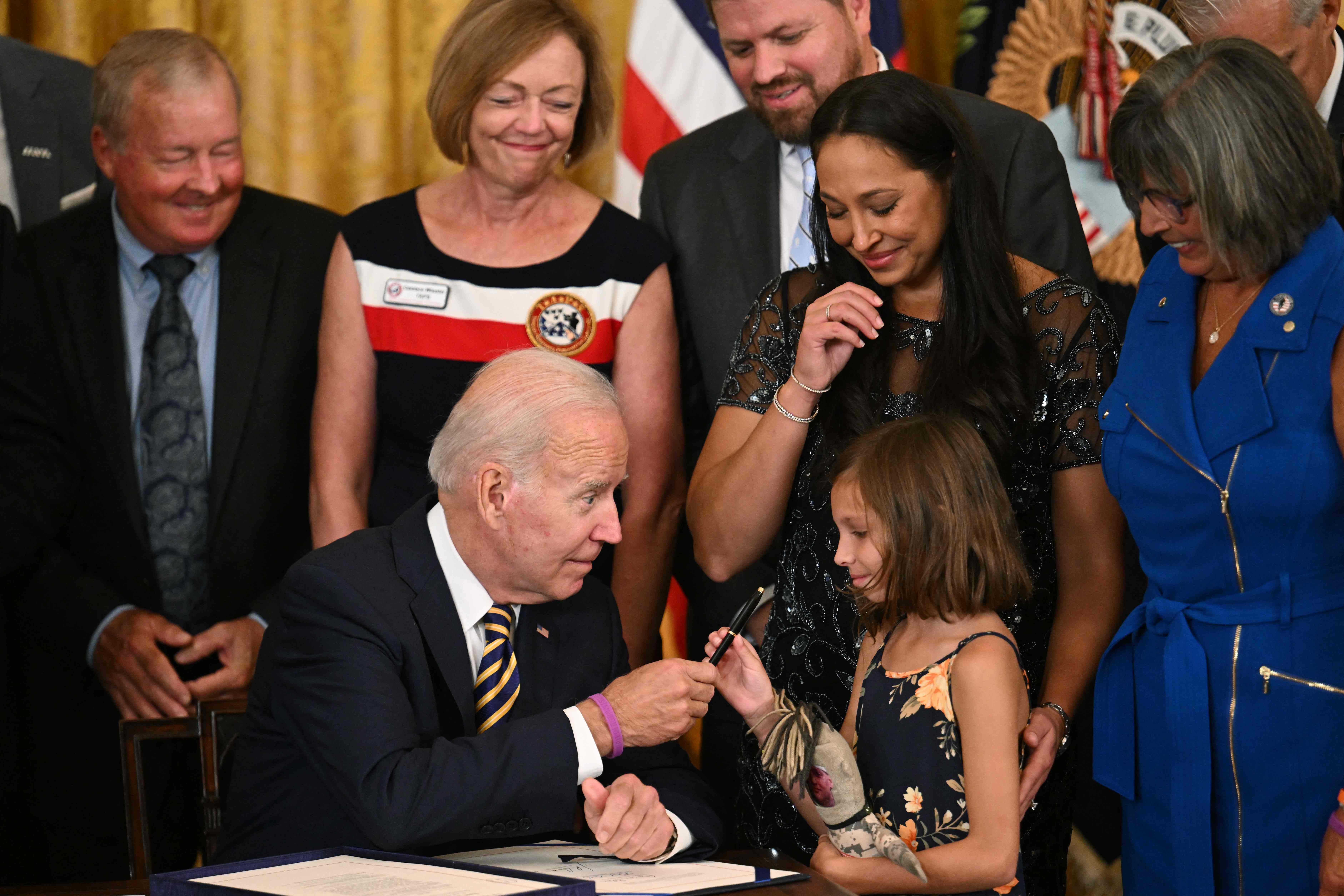Biden signs PACT Act providing care to veterans after burn pits exposure, praises Jon Stewart for advocacy
‘I was going to get this done come hell or high water’ says Biden
Your support helps us to tell the story
From reproductive rights to climate change to Big Tech, The Independent is on the ground when the story is developing. Whether it's investigating the financials of Elon Musk's pro-Trump PAC or producing our latest documentary, 'The A Word', which shines a light on the American women fighting for reproductive rights, we know how important it is to parse out the facts from the messaging.
At such a critical moment in US history, we need reporters on the ground. Your donation allows us to keep sending journalists to speak to both sides of the story.
The Independent is trusted by Americans across the entire political spectrum. And unlike many other quality news outlets, we choose not to lock Americans out of our reporting and analysis with paywalls. We believe quality journalism should be available to everyone, paid for by those who can afford it.
Your support makes all the difference.President Joe Biden has signed into law the PACT Act, which will provide life-saving care to veterans who have been exposed to burn pits.
In remarks at the White House, Mr Biden called it the “most significant law our nation has ever passed to help veterans who were exposed to toxic substances” and said: “I was gonna get this done come hell or higher water.”
He added that this was one of those issues that both Republicans and Democrats could work on together, thanking members of Congress for their work: “This law was long overdue and we got it done together.”
The president also thanked the campaigners and veterans groups who have pushed for the federal government to act. He specifically thanked comedian Jon Stewart: “You refused to let anybody forget ... we owe you big, man.”
Having specifically asked lawmakers to work on such legislation during his State of the Union Address, the bipartisan effort is another significant achievement for the president.
The full title of the bill is the Sergeant First Class Heath Robinson Honoring our Promises to Address Comprehensive Toxics (PACT) Act of 2022.
During the State of the Union speech, the president shared the story of Sergeant First Class Heath Robinson, who died two years ago from a rare form of lung cancer caused by toxic exposure to burn pits in Iraq.
On Wednesday, his nine-year-old daughter Brielle, widow Danielle Robinson and mother-in-law Susan Zeier joined the president in Washington for the bill signing.
Danielle had attended the SOTU in March as first lady Jill Biden’s guest, and days later, the PACT Act was renamed after Heath.
Mr Biden’s commitment to supporting veterans is deeply personal; he often speaks of his late son Beau and his belief that his terminal cancer was caused by exposure to burn pits.
Beau was a captain in the Delaware Army National Guard and was deployed to Iraq in 2008, spending much of the next year breathing in the 10-acre burn pit at Balad Air Force Base.
In 2015 he died at the age of 46 following a battle with glioblastoma, an aggressive form of brain cancer.
During the bill signing, the president acknowledged his grandson, who was sitting in the audience next to Brielle, and said: “My grandson, his daddy, [was] lost to the same burn pits. He knows what you’re going through.”
After the signing, Mr Biden offered the pen he used to Brielle.
Despite being a bipartisan effort, the bill still stumbled in the Senate when Republicans blocked the legislation over a “budget gimmick”, claiming spending on veterans should be discretionary and not mandatory.

Many GOP lawmakers who had previously supported the bill changed their vote and it failed at 55-42, five short of the 60 votes needed, sparking outrage from campaigners including Mr Stewart.
After footage emerged of Republican senators celebrating the failure on the Senate floor, Mr Stewart slammed them as “despicable” for “celebrating their victory over veterans with cancer”.
“Way to go, guys! You finally handed it to ‘big veteran with cancer.’ Well done,” he mocked them.
Advocates within the Senate went to work convincing their colleagues of the importance of the bill and that the spending should be mandatory so as not to effectively ask veterans’ groups to come to Washington and beg for their money each year.
These included Democratic senators Kirsten Gillibrand, and Jon Tester, chairman of the Senate Veterans’ Affairs Committee, and Republican senators Jerry Moran, the ranking member, and John Boozman of Arkansas.
Once fear about the funding had been allayed, a revote was scheduled for 3 August and only 11 senators came out against the bill, sending it to the president’s desk for his signature.
This is the third major piece of legislation President Biden has signed in two days, with the Inflation Reduction Act expected to pass the House later this week and be signed into law soon after.





Join our commenting forum
Join thought-provoking conversations, follow other Independent readers and see their replies
Comments